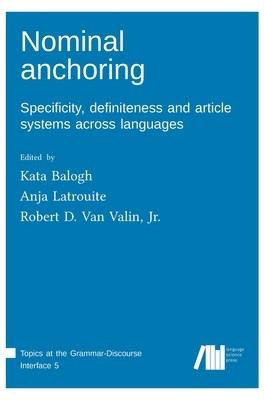
- We will send in 10–14 business days.
- Publisher: Language Science Press
- Year: 2020
- Pages: 212
- ISBN-10: 3961102856
- ISBN-13: 9783961102853
- Format: 17 x 24.4 x 1.3 cm, kieti viršeliai
- Language: English
- SAVE -10% with code: EXTRA
Nominal anchoring (e-book) (used book) | bookbook.eu
Reviews
Description
The papers in this volume address to different degrees issues on the relationship of articles systems and the pragmatic notions of definiteness and specificity in typologically diverse languages: Vietnamese, Siwi (Berber), Russian, Mopan (Mayan), Persian, Danish and Swedish. The main questions that motivate this volume are: (1) How do languages with and without an article system go about helping the hearer to recognize whether a given noun phrase should be interpreted as definite, specific or non-specific? (2) Is there clear-cut semantic definiteness without articles or do we find systematic ambiguity regarding the interpretation of bare noun phrases? (3) If there is ambiguity, can we still posit one reading as the default? (4) What exactly do articles in languages encode that are not analyzed as straightforwardly coding (in)definiteness? (5) Do we find linguistic tools in these languages that are similar to those found in languages without articles? Most contributions report on research on different corpora and elicited data or present the outcome of various experimental studies. One paper presents a diachronic study of the emergence of article systems. On the issue of how languages with and without articles guide the hearer to the conclusion that a given noun phrase should be interpreted as definite, specific or non-specific, the studies in this paper argue for similar strategies. The languages investigated in this volume use constructions and linguistic tools that receive a final interpretation based on discourse prominence considerations and various aspects of the syntax-semantics interface. In case of ambiguity between these readings, the default interpretation is given by factors (e. g., familiarity, uniqueness) that are known to contribute to the salience of phrases, but may be overridden by discourse prominence. Articles that do not straightforwardly mark (in)definiteness encode different kinds of specificity. In the languages studied in this volume, whether
EXTRA 10 % discount with code: EXTRA
The promotion ends in 22d.13:05:25
The discount code is valid when purchasing from 10 €. Discounts do not stack.
- Publisher: Language Science Press
- Year: 2020
- Pages: 212
- ISBN-10: 3961102856
- ISBN-13: 9783961102853
- Format: 17 x 24.4 x 1.3 cm, kieti viršeliai
- Language: English English
The papers in this volume address to different degrees issues on the relationship of articles systems and the pragmatic notions of definiteness and specificity in typologically diverse languages: Vietnamese, Siwi (Berber), Russian, Mopan (Mayan), Persian, Danish and Swedish. The main questions that motivate this volume are: (1) How do languages with and without an article system go about helping the hearer to recognize whether a given noun phrase should be interpreted as definite, specific or non-specific? (2) Is there clear-cut semantic definiteness without articles or do we find systematic ambiguity regarding the interpretation of bare noun phrases? (3) If there is ambiguity, can we still posit one reading as the default? (4) What exactly do articles in languages encode that are not analyzed as straightforwardly coding (in)definiteness? (5) Do we find linguistic tools in these languages that are similar to those found in languages without articles? Most contributions report on research on different corpora and elicited data or present the outcome of various experimental studies. One paper presents a diachronic study of the emergence of article systems. On the issue of how languages with and without articles guide the hearer to the conclusion that a given noun phrase should be interpreted as definite, specific or non-specific, the studies in this paper argue for similar strategies. The languages investigated in this volume use constructions and linguistic tools that receive a final interpretation based on discourse prominence considerations and various aspects of the syntax-semantics interface. In case of ambiguity between these readings, the default interpretation is given by factors (e. g., familiarity, uniqueness) that are known to contribute to the salience of phrases, but may be overridden by discourse prominence. Articles that do not straightforwardly mark (in)definiteness encode different kinds of specificity. In the languages studied in this volume, whether


Reviews